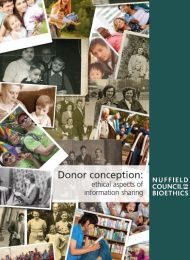Donor conception: ethical aspects of information sharing
Report
Published 17/04/2013

Potential donors undergo careful medical screening before they are allowed to donate. However, information about the medical history of the donor is still a source of concern for some donor-conceived people and their parents.
In most cases, information about a donor’s personal and family medical history will not, in fact, be medically useful for the donor-conceived person. This is because of the screening and assessment that potential donors undergo before they are accepted as donors, and because family histories of particular medical conditions often have ‘low predictive value’ – they play only a very small part in determining whether or not a person develops a particular condition.
However there are some medical conditions that are strongly heritable: if the donor has the condition, then their offspring are also likely to develop it. Current guidelines make clear that potential donors who are known to have a strongly heritable condition – or have a close family member with such a condition – are not allowed to donate.
Occasionally there may be something in the donor’s own medical or family history that is not serious enough to prevent the donor from donating, but could still be relevant information for the donor-conceived person to know for their own health care. More guidance is needed for health professionals as to what information might be relevant to the future health care of the donor-conceived person so that, if useful, information can be passed on appropriately.
Also, some heritable conditions only appear relatively late in life (‘late-onset’ conditions). If a donor is diagnosed with a serious strongly heritable condition after donation, it is important that this information can be passed on to the donor-conceived person and their family. Similarly, if a donor-conceived child is born with a serious inherited condition, it is important that there is a way of passing this information back to the donor.
We conclude
It is important that all health professionals, in their day-to-day practice, ask themselves why they are seeking information about a person’s family history, and only do so where this might genuinely be useful for the person’s care.
Parents need clear information about the screening procedures that the donor has undergone, so that they can be reassured that the risk of their child developing a serious strongly heritable condition is very low. Where no additional information about the donor’s health is available, it should be clear that this is because there is no relevant information to provide – not because the donor was unwilling to provide it.
Medical information about the donor or the donor’s family is only useful if it is likely to have an effect on the donor-conceived person’s health or health care, and should not be made available otherwise.

Share